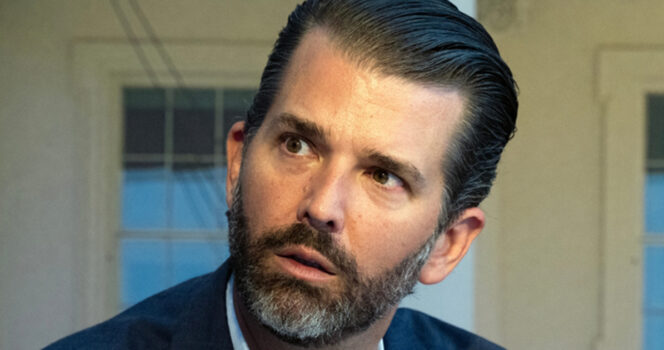President Joe Biden, 82, was recently diagnosed with aggressive prostate cancer that has metastasized to his bones, according to a statement released by the White House medical team. The diagnosis has prompted a wide array of responses from public figures, political leaders, and citizens alike — including from the Trump family.
While former President Donald Trump issued a statement wishing Biden a “fast and successful recovery,” his son, Donald Trump Jr., attracted public attention and criticism for comments he posted online that were considered by many to be inappropriate or lacking empathy.
President Biden’s Diagnosis: A Medical Overview
According to Johns Hopkins Medicine and Healthline, aggressive prostate cancer refers to cancer that grows rapidly and has a higher risk of spreading beyond the prostate. The diagnosis of metastatic prostate cancer often follows imaging and biopsy procedures and is typically classified with a Gleason score. A score of 9 (Grade Group 5) — which media reports suggest applies in this case — is considered high-grade and associated with rapid progression.
The White House statement, issued on May 18, 2025, confirmed that while the cancer is aggressive, it is hormone-sensitive, meaning it may respond positively to hormone therapy, a common treatment for prostate cancer.
The statement emphasized that the President is continuing his duties and receiving care from a multidisciplinary team of oncology and urology specialists.

Responses from Public Figures
Reactions to the announcement spanned the political spectrum, with many lawmakers, public officials, and commentators expressing support for President Biden during this time.
Former President Donald Trump’s Message
In a social media post, former President Donald J. Trump conveyed his well-wishes, stating, “Politics aside, I hope Joe Biden has a speedy recovery.” His statement was received as a respectful gesture and echoed by several Republican and Democratic lawmakers alike.
Rep. Marjorie Taylor Greene
Georgia Representative Marjorie Taylor Greene, a known figure in the Make America Great Again (MAGA) movement, also shared a message of sympathy. She wrote, “Cancer is a terrible disease. My prayers go out to President Biden and his family.” Greene has previously spoken publicly about her father’s battle with cancer, giving context to her empathetic message.
Donald Trump Jr.’s Comments and Backlash
While Donald Trump Jr. initially echoed a sentiment similar to his father’s — wishing Biden well and calling for politics to be set aside — he later published posts that some perceived as undermining the seriousness of the situation.
In particular, he reposted a message questioning whether First Lady Dr. Jill Biden, an educator with a doctorate in education, should have noticed health issues earlier. He also speculated on whether the diagnosis had been known internally before it was disclosed publicly. This led to significant criticism, especially given the lack of evidence behind such assertions.

Public Reaction
Trump Jr.’s remarks prompted widespread discussion on X (formerly Twitter) and other platforms. Numerous users, including public commentators, medical professionals, and everyday citizens, voiced concern over the tone and timing of the comments.
Comments ranged from calls for empathy during a health crisis to broader critiques of political discourse in the United States. Some pointed out that public speculation about a cancer diagnosis — especially without medical credentials or direct involvement — risks spreading misinformation or misunderstanding of a complex health issue.
One user wrote, “Serious health diagnoses require compassion, not conspiracies. Let’s respect the process of medical care and privacy.” Others encouraged public figures to defer to medical professionals and verified information when commenting on such topics.
The Role of Medical Transparency in Politics
Transparency in the health status of sitting presidents has long been a topic of discussion in American political life. The Presidential Records Act and public health briefings aim to ensure that voters remain informed about the capacity of elected leaders to carry out their duties.
However, experts warn against speculative interpretations of medical reports. Dr. Otis Brawley, a professor of oncology and epidemiology at Johns Hopkins University, has emphasized in public lectures that “cancer outcomes depend on many factors, including biology, access to care, and timely intervention.”
Responsible Commentary on Health News
Organizations such as the American Cancer Society (ACS) and National Cancer Institute (NCI) provide educational resources on prostate cancer, including common symptoms, treatment protocols, and prognosis.
According to the ACS, over 280,000 new cases of prostate cancer are diagnosed in the U.S. each year. While it is one of the most common cancers in men, it also has a high survival rate when detected early and treated appropriately.
Misinformation or premature conclusions about someone’s health — especially when amplified by high-profile individuals — can lead to public confusion and unnecessary panic.
Calls for Civility and Empathy
Several political leaders and advocacy groups have called for more respectful discourse, especially when discussing health matters. The Cancer Support Community, a nonprofit focused on supporting individuals impacted by cancer, released a statement urging public figures to “choose empathy over division when speaking about cancer, regardless of political affiliation.”
In the current polarized political climate, such moments are seen as opportunities to unite around shared human experiences like illness, recovery, and resilience.
Legal and Ethical Considerations in Public Communication
While individuals are entitled to free speech under the First Amendment, public figures often face greater scrutiny due to their influence. Ethical communication standards, as advocated by journalism organizations and public relations professionals, recommend avoiding unverified claims and promoting responsible discourse — particularly on sensitive topics like health.
Statements that allege wrongdoing without supporting evidence, such as accusations of a “cover-up,” may violate platform guidelines or contribute to misinformation if not handled with care.
Conclusion
As President Biden continues treatment under the guidance of medical professionals, many Americans are watching closely — not only his health but how the nation responds in moments of vulnerability.
While former President Donald Trump’s message was viewed by many as appropriately respectful, the subsequent commentary from Donald Trump Jr. has raised questions about tone, timing, and the responsibilities of public figures when discussing sensitive health matters.
For readers seeking accurate and up-to-date information on prostate cancer, the following official sources are recommended:
- White House Medical Briefings
- American Cancer Society
- National Cancer Institute
- Centers for Disease Control and Prevention – Prostate Cancer






